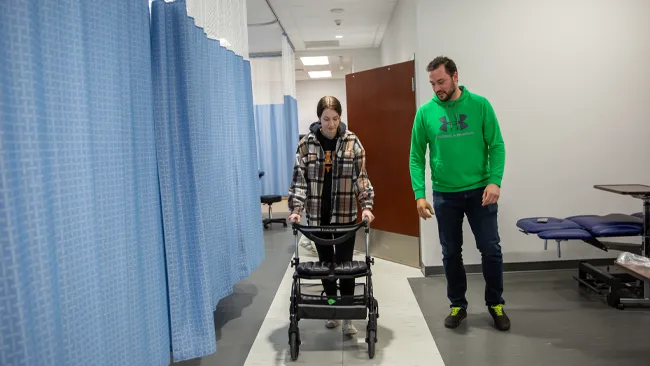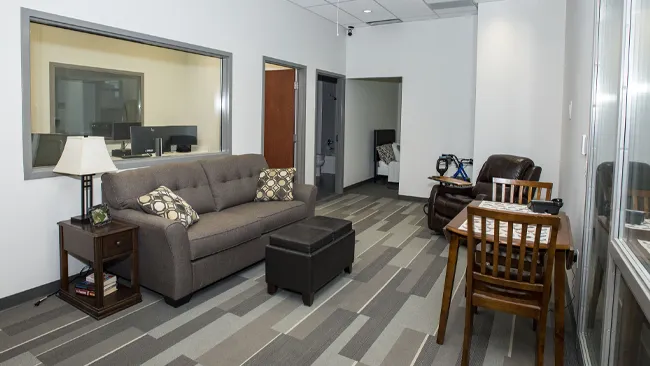
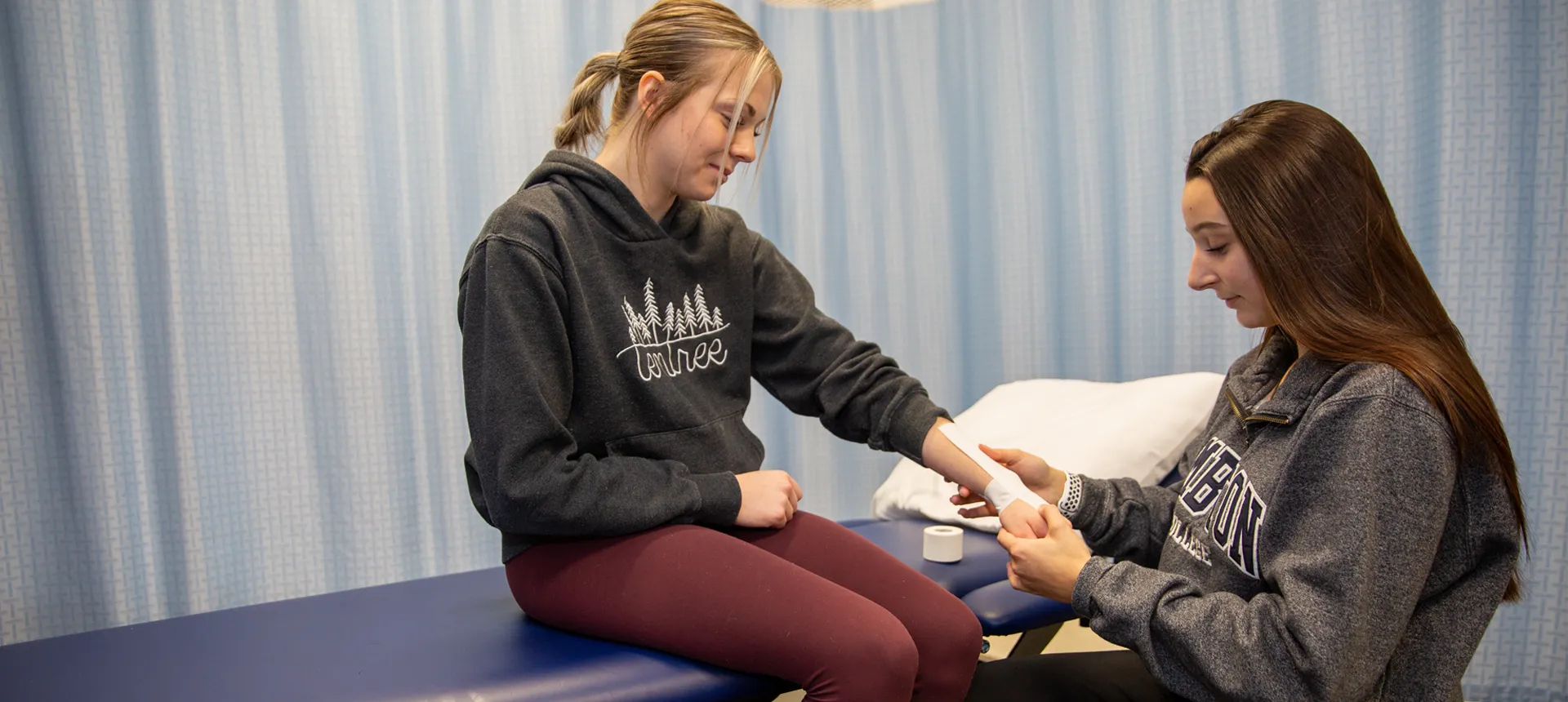
Occupational Therapist Assistant & Physiotherapist Assistant
Overview
Are you an empathetic individual who is interested in the overall health and wellness of others? Explore a career as an Occupational Therapy & Physiotherapist Assistant - the need has never been greater.
With ever-increasing numbers of aging people requiring assistance to continue a full life and with changes to the way health care services are delivered, the need has never been greater for Occupational Therapist Assistants and Physiotherapist Assistants.
The Lambton College Occupational Therapist & Physiotherapist Assistant, Ontario College Diploma program will train students to support and enable individuals of all ages whose ability to function in their daily activities has been impaired due to illness, injury, surgery, or chronic health conditions. Students learn how to assist in implementing treatment plans that promote a client's independence in activities that are meaningful and important to them.
The unique program curriculum will engage students throughout the four terms, as students learn how to assist clients to achieve their health goals and improve their quality of life. The faculty members in the program are experienced occupational therapists, physiotherapists, and assistants who work in a variety of health care settings. Faculty will ensure that students are well equipped with theoretical knowledge, training, and hands-on experience to become successful health care professionals. The integration of in-class studies with hands-on experience is accomplished through rich experiential lab opportunities and practice in a variety of clinical fieldwork placement settings.
Admission Requirements
O.S.S.D. or equivalent with:
- Grade 12 English C or U
- Grade 11 or 12 Biology C or U
-or-
Grade 11 or 12 Chemistry C or U
(both recommended, only one required)
Academic admission requirements can be obtained through Academic Upgrading and the Pre-Health Sciences Pathway to Advanced Diplomas & Degrees (PHDP) at Lambton College. All course requirements must be completed no later than the first day of classes of term one.
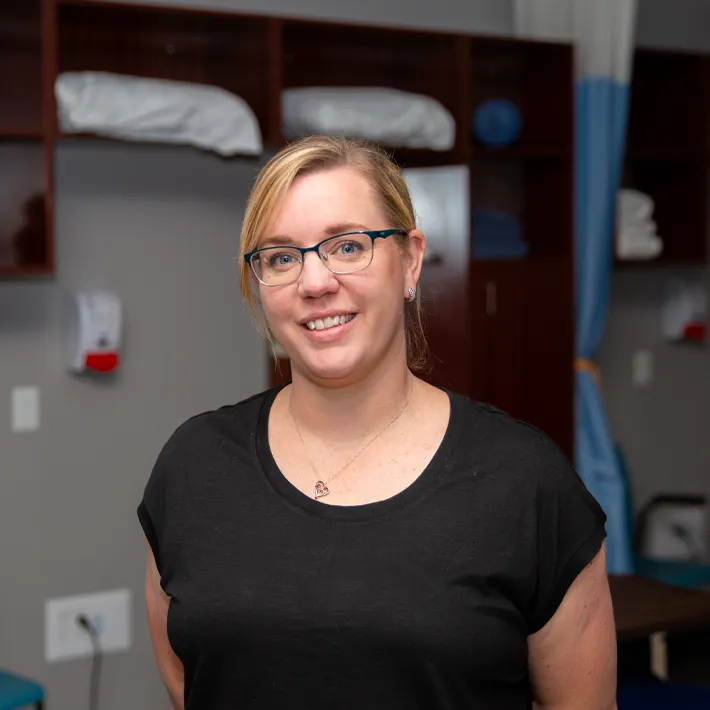
Wendy Posadas - Mom of two and OPTA student
Wendy's Story
"After years of having a career in a creative field, I felt a desire to move into something health care related. While researching options and opportunities, I had some family experience with various therapies through local services and the OTA/PTA career path really caught my attention. I was excited about the possibilities that came with working in this field.
I love that all of the teachers have actual field experience. Their field knowledge has helped me gain further understanding of the role of an occupational therapy assistant and the many career opportunities that are available."
Costs
- Year 1 $4,156.71
- Year 2 $4,066.68
Please Note: These fees apply to the 2025-2026 academic year and are subject to change. Fees do not include books (unless specifically noted), supplies or living costs.
Additional Fees
-
Textbooks (per year)$1,000.00
-
Passport to Placement$40.00
-
Name Tag$15.00
-
Police Records Check$40.00
Travel Expenses
Students are responsible for all costs associated with traveling to clinical placements.
Technology Requirements
In order to keep pace with the requirements of each and every course in your program, Lambton College requires that each student have access to a laptop while studying at our college.
Labs & Equipment
Courses
Human Anatomy & Physiology I
This course is the first of two courses that provide a basic introduction to the structure and function of the human body. The micro and macro anatomy of selected organ system are examined, and the interrelation of physiology is discussed. The constituents of the body are introduced with focus on foundational concepts such as movement, support, and transportation. Course content is designed with OTA/PTA applications and acts as a framework for understanding rehabilitation of the human body.
Human Movement & Functions
This course introduces learners to concepts of normal human movement within a three dimensional context. Students learn how to describe the body in motion as it relates to function and mobility. Students also explore concepts of posture including its dynamic transitions through activity. An introduction to basic patient handling and proper body mechanics for the Occupational Therapist Assistant (OTA) and Physiotherapist Assistant (PTA) is reinforced.
Introduction to Rehabilitation
This course introduces the definition and broad concept of rehabilitation including the various forms of its delivery. The specific fields of Occupational Therapy and Physical Therapy are explored with a focus on principles of theory and models of practice. A foundational understanding of professional practice begins to be formulated through an examination of the role and scope of practice for the OTA/PTA, professional organizations, and governing legislation.
Clinical Conditions in Rehabilitation
This course outlines commonly encountered diagnoses and medical conditions where rehabilitation services are often indicated. A general overview of conditions, their causes and basic medical management are discussed. Emphasis however, is focused on how occupational and physical therapy approaches are used to facilitate recovery.
Critical Thinking & Writing
This writing course challenges students to explore diverse opinions and articulate their own perspectives clearly and persuasively. Through critical reading, students will develop skills in synthesis, analysis, comparison, and response, striving for clarity and diplomatic expression of their opinions based on factual evidence. Students will practice various rhetorical strategies of persuasion and hone their writing to ensure precision and accuracy in their messages. This course lays the foundation for a subsequent research-writing course, equipping students with essential skills for academic success.
Human Growth & Development
Using a developmental psychology lens this course focuses on providing students with an opportunity to improve understanding of development and self in the context of global community. Students will examine the human lifespan from infancy to old age, across physical, cognitive, social and personality contexts. Foundational theories, socio-cultural and historical context, as well as an examination of current issues within Canada, provide the learner with opportunities for critical thinking and a better understanding of the influences on their own development and self-awareness. Applied learning assignments provide learners with the opportunity to demonstrate learning while also adding to their co-curricular record. Global partnership, diversity and equity, epigenetic change, and transgenerational impact are recurring themes throughout.
General Education Elective
Human Anatomy & Physiology II
This course is the second of two courses that provide a basic introduction to the structure and function of the human body. The constituents of the body are introduced with focus on foundational concepts such as communication, control, integration, and reproduction. Students will continue to develop their musculoskeletal knowledge base while expanding into interrelated body systems. Course content is designed with OTA/PTA applications and acts as a framework for understanding rehabilitation of the human body.
OTA Skills - Occupation
This course highlights OT treatment as it applies to the three occupational domains of self-care, productivity and leisure. Techniques within the scope of the OTA role are thoroughly examined including core concepts of activity selection, activity analysis, grading and compensation / adaptation. Consideration of clients across age and diagnostic spectrums are achieved. Through course assignments and structured labs, students develop clinical skill-sets in preparation for Fieldwork Experience.
Communications for Health Sciences
This course, designed for students in the health field, further develops students' communication proficiency. Students create workplace documents and research reports and share their findings through oral presentations. Advocacy and peer education will drive the research and documentation process. Current health issues and research will serve as the impetus for creation of informed research reports and presentations.
Psychology
This course provides a foundational overview of psychology, exploring the biological and cognitive processes that underlie human behaviour and experience. Students are required to purchase the assigned textbook to be successful in the course.
OTA/PTA Skills - Foundations of Therapeutic Exercise
Therapeutic exercise will be a large focus for this course. Students will begin to develop an understanding of the body's response to therapeutic exercise. Students will develop an appreciation for how strength, range of motion and stretch are key components to an effective treatment plan. Principles of indication and exercise prescription, as well as contraindications will be addressed. Lab session will allow the student to develop and practice handling techniques that promote safe and effective patient outcomes.
General Education Elective (Select 2)
Field Experience Prep
This course addresses topics to prepare students for practical Fieldwork Experience. Clinical documentation and communication are studied with an emphasis on accuracy, relevancy and priority. An introduction to Subjective, Objective, Assessment, Plan (SOAP) and Data Action, Response, Plan (DARP) formats are covered. Basic principles and practices of Infection Control as it applies to rehabilitative settings are discussed. An introduction to Workload Measurement is also provided. Emerging personal professionalism is studied with the creation of a Learning Portfolio at the conclusion of the course. This tool is used during work-site placements to guide personal development and promote self-reflection.
OTA/PTA Skills - Transfers, Gait & Mobility
This course explores the principles and techniques applied to facilitate a client's ability to transfer, ambulate and mobilize to their full potential. Concepts of balance retraining are covered. The student will be encouraged to develop an appreciation for how movement retraining, combining functional and repetitive practice, results in best client outcomes. The use of gait aids, orthoses, bracing, and other assistive aids will be highlighted.
OTA/PTA Clinical Skills - Electrophysical Modalities & Cardiopulmonary Rehabilitiation
This course explores additional therapeutic techniques available to the OTA/PTA. Electrophysical agents and hydrotherapy are introduced. Foundations of cardiopulmonary rehabilitation including aerobic exercise training and respiratory/breathing exercise are also studied. Finally, strategies for effective exercise instruction and client coaching are explored.
OTA Clinical Skills - Person & the Environment
This course highlights Occupational Therapy treatment as it applies at the level of the person and the environment. Techniques within the scope of the OTA role is thoroughly examined including concepts of seating, upper extremity function and positioning, environmental adaptation and advocacy. Consideration of clients across age and diagnostic spectrums is achieved. Through course assignments and structured labs students enhance their clinical skill-sets in preparation for Fieldwork Experience.
Enhanced Therapeutic Skills
This course examines tailored and effective approaches that can be used by an OTA/PTA to enhance therapeutic encounters with clients. Specific focus is on conditions of impairment related to communication, cognition, perception and mental health. Laboratory work promotes an experiential component along with formal skills acquisition. Concepts of therapeutic use of self and group treatment are addressed.
Field Experience I
Skills within the assistant role are practiced and progressed from a basic-level to an intermediary-level of competency. Students use their personal learning portfolios to track and enhance the learning experience.
Clinical Case Studies - Consolidation
This course follows a group-based format that allow students to engage in solution-focused learning. Course content chronicles select patients whose rehabilitative profiles reflect diversity in diagnosis, personal attributes and complexity of care. Within their role as an OTA/PTA, students integrate cumulative course material as they document the therapeutic process, implement and modify treatment plans, anticipate barriers to progress and generate solutions that promote therapeutic success and satisfaction. Elements of safety, interdisciplinary collaboration, advocacy and professional ethics will be woven into the learning process to promote enhanced consolidation.
Rehabilitation - Broader Perspectives & Current Trends
This course explores rehabilitation from both a national and international perspective. Rehabilitation as a component of the Canadian Health Care System is compared to that of its place on the global stage. Students become familiar with the World Health Organization and the International Classification of Functioning, Disability and Health. Current trends in research (including roots of international origin) are discussed. Topics of classroom discussion and assignment foster an appreciation for how rehabilitation services are influenced by research, resources, and both geographic and cultural diversity.
Professional Practice
This course explores select components of professional practice: non-clinical supportive roles, worksite logistics, personal presentation and time management. In addition, students have the opportunity to become broadly familiar with resume and interview trends in the healthcare field, creative job search strategies and resources that can support an OTA/PTA that is employment-ready.
Field Experience II
During the field experience, skills within the assistant role are practiced and progressed from an intermediatory-level of a competency to a level where the student will be fully competent to enter practice.
Contact
School of Fire Science, Health & Community Services
Program Information
After Graduation
Employment Opportunities
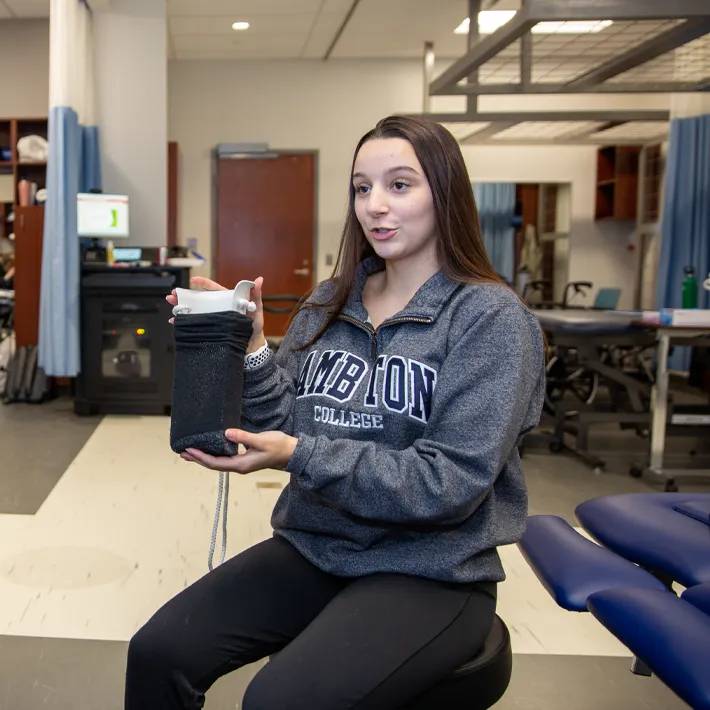
Upon graduation, students are prepared to work as an occupational therapist and physiotherapist assistant under the supervision of a registered occupational therapist or physiotherapist. Employment opportunities with competitive salaries are readily available in a variety of settings such as, hospitals, long term care homes, community agencies, private clinics, schools, and children's treatment centres.
Accreditations & Certifications
Certificates & Training
Students in this program will obtain the following certifications as part of the program curriculum:
- Gentle Persuasive Approach
- Non-Violent Crisis Intervention Training
Pathways
Transfer to Programs within Ontario
- Bachelor of Commerce (Post Diploma)
- Bachelor of Commerce with Major (Post Diploma)
- Bachelor of Management 3-year (Post Diploma)
- Bachelor of Human Resources Labour Relations (Post Diploma)
- Bachelor of Science (Post Diploma)
- Bachelor of Science with Majors (Post Diploma)
- Bachelor of Professional Arts - Human Services (BPA-HSRV)
- Bachelor of Professional Arts - Criminal Justice Major (BPA-CRJS)
- Bachelor of Professional Arts - Governance, Law & Management (BPA-GLM)
- Bachelor of Professional Arts - Communication Studies (BPA-CMNS)
Want to see more Ontario transfers? Visit ONTransfer.ca.
Placement
Placement Schedule
Students will have the opportunity to acquire hands-on experience in unpaid placements in the second year of the program. There will be two, seven-week long placements where students will obtain over 500 hours of Occupational Therapy Assistant and Physiotherapist Assistant experience. Placement sites include hospitals, clinics, home care, long term care homes, schools, and children's treatment centres.
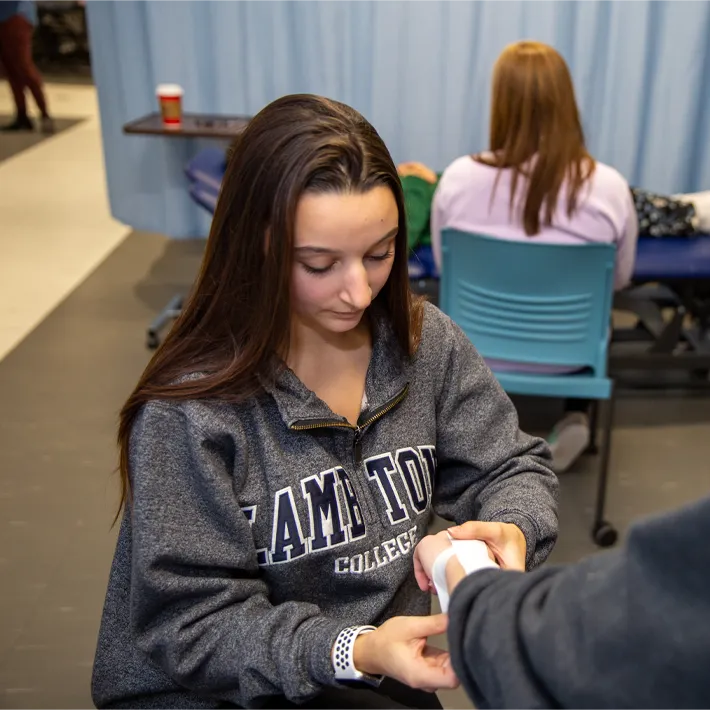
Vaccinations & Police Record Checks
Students considering this program should be aware that there are field placement requirements. All placements require students to have police record checks. Proof of immunizations is also required and must be cleared through Passport to Placement.
Once you’ve applied, you can log in to mylambton.ca and view the program-specific Field & Clinical Placement Requirements. If you need information about these requirements before applying, please contact placementinfo@lambtoncollege.ca.
More Information
Technology Requirements
It is recommended that you use a Windows laptop for your coursework. While other devices like MacBooks or Chromebooks might work for some tasks, they may not support all the software required for your program. If you're unsure, check with your professors before buying.
Internet Speed Requirements
To get the best experience while learning online, we recommend having an internet connection with at least 40 Mbps download speed and 10 Mbps upload speed. This will help you use video calls, attend online lectures, and access other learning tools smoothly.
Because students live in many different areas, we can't suggest a specific internet provider. You'll need to check with local companies to find one that works best for you.
Laptop Requirements
In order to access the internet and virtually-delivered software and courseware, student laptops should include the following at a minimum. By meeting the following specifications, students will be equipped to access software and courseware on their laptop through the internet:
- Intel i5 8th Gen Processor or equivalent
- 8GB of RAM
- 100 GB HDD or more
- Webcam with a microphone
- Wi-Fi capable (802.11n/ac 5GHz)
- Windows 11 operating system
Mobile Device
Students will require a mobile device (smartphone) for:
- Accessing your digital student ID
- Using campus applications and services
Software
To ensure students are getting the most our of their classroom experience, some software will be required.
Lambton College has made this software easily accessible online. Students can leverage our Microsoft Office 365 software packages and services. In addition, much of the software you require for your courses will be available on demand for use on any device - on or off campus.
